.......
Για μας ήταν άλλο πράγμα ο πόλεμος για την πίστη του Χριστού
και για την ψυχή του ανθρώπου καθισμένη στα γόνατα
της Υπερμάχου Στρατηγού,
που είχε στα μάτια ψηφιδωτό τον καημό της Ρωμιοσύνης,
εκείνου του πέλαγου τον καημό σαν ήβρε το ζύγιασμα
της καλοσύνης.
.......
Γ. Σεφέρη, Νεόφυτος ο Έγκλειστος μιλά
Loreena McKennitt's commentary on the song, taken from the transcript of an audio interview:
There is an instrumental called "Kecharitomene" and this piece of music was inspired primarily from three different directions. One of the inspirations harkens back to a book by a woman called Susan Whitfield. The book was called Life Along the Silk Road and it's a wonderful profiling of different kinds of people who travelled up and down the Silk Road, whether they were soldiers, whether they were monks, whether they were merchants. And it gives a very intimate taste of what their experience was and the different cultural expressions and permutations there was along the Silk Road at that time, how those cultural permutations expressed themselves in food or in music or in religion, even animal husbandry. And again, I'm always fascinated to look at places or roads or circumstances where cultures come together and influence each other.
One of the other inspirations came through a book called Warriors of God by a man named James Renton and it examines this sort of collision of cultures during the time of the Crusades and particularly focusing on where this collision between the Christian West and the Muslim world, and more particularly, at the end of the 12th century, and profiles the roles of Richard I or the Lionheart and the Muslim leader Saladin. And I think what I found fascinating about this book is that we in the West, you might say, have heard one side of that or a couple of similar sides to that slice of history but, indeed, we haven't heard more of the more eastern or Muslim side. And again, although this is a snapshot of history, it has very, very contemporary relevance.
The third strand of inspiration for the song, "Kecharitomene", arises and in fact informs the name, it arises from a woman called Anna Comnena who was really the first female historian and she lived around the time of the later Crusades and she chronicled this very bloody period of the Crusades. And she ended her days in a convent in Istanbul which was called Kecharitomene which essentially means full of grace.
Loreena McKennitt's commentary on the song, taken from the transcript of an audio interview:
There is an instrumental called "Kecharitomene" and this piece of music was inspired primarily from three different directions. One of the inspirations harkens back to a book by a woman called Susan Whitfield. The book was called Life Along the Silk Road and it's a wonderful profiling of different kinds of people who travelled up and down the Silk Road, whether they were soldiers, whether they were monks, whether they were merchants. And it gives a very intimate taste of what their experience was and the different cultural expressions and permutations there was along the Silk Road at that time, how those cultural permutations expressed themselves in food or in music or in religion, even animal husbandry. And again, I'm always fascinated to look at places or roads or circumstances where cultures come together and influence each other.
One of the other inspirations came through a book called Warriors of God by a man named James Renton and it examines this sort of collision of cultures during the time of the Crusades and particularly focusing on where this collision between the Christian West and the Muslim world, and more particularly, at the end of the 12th century, and profiles the roles of Richard I or the Lionheart and the Muslim leader Saladin. And I think what I found fascinating about this book is that we in the West, you might say, have heard one side of that or a couple of similar sides to that slice of history but, indeed, we haven't heard more of the more eastern or Muslim side. And again, although this is a snapshot of history, it has very, very contemporary relevance.
The third strand of inspiration for the song, "Kecharitomene", arises and in fact informs the name, it arises from a woman called Anna Comnena who was really the first female historian and she lived around the time of the later Crusades and she chronicled this very bloody period of the Crusades. And she ended her days in a convent in Istanbul which was called Kecharitomene which essentially means full of grace.
Ευχαριστώ τον φίλο Γ.Μ. για την Θεομητορική ψηφίδα, σήμερα Παρασκευή των Α' Χαιρετισμών.




















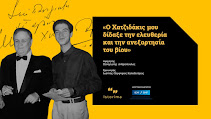



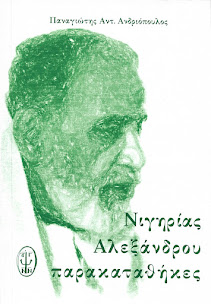

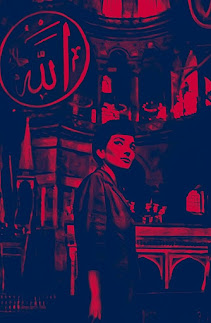
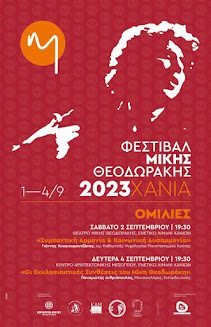
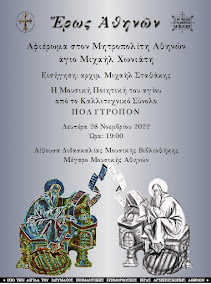

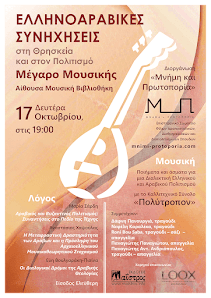



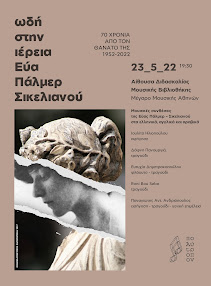





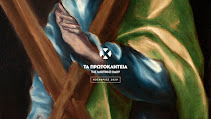

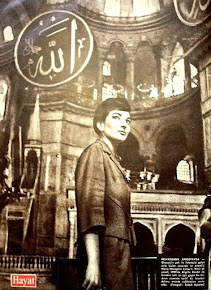
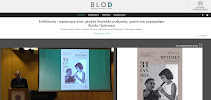
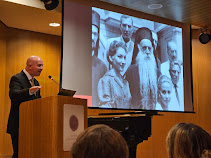
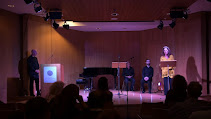




























Δεν υπάρχουν σχόλια:
Δημοσίευση σχολίου